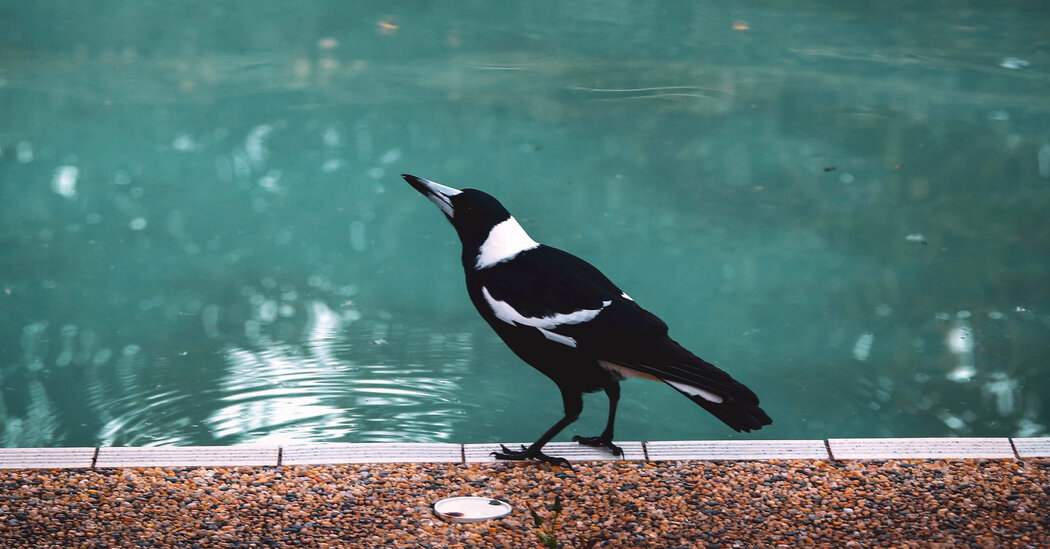

The Australian magpie is one of the cleverest birds on earth. It has a beautiful song of extraordinary complexity. It can recognize and remember up to 30 different human faces.
But Australians know magpies best for their penchant for mischief. An enduring rite of passage of an Australian childhood is dodging the birds every spring as they swoop down to attack those they view as a threat.
Magpies’ latest mischief has been to outwit the scientists who would study them. Scientists showed in a study published last month in the journal Australian Field Ornithology just how clever magpies really are and, in the process, revealed a highly unusual example in nature of birds helping one another without any apparent tangible benefit to themselves.
In 2019 Dominique Potvin, an animal ecologist at University of the Sunshine Coast in Australia, set out to study magpie social behavior. She and her team spent around six months perfecting a harness that would carry miniature tracking devices in a way that was unintrusive for magpies. They believed it would be nearly impossible for magpies to remove the harnesses from their own bodies.
Dr. Potvin and her team attached the tracking devices and the birds flew off, showing no signs of obvious distress. Then everything began to unravel.
“The first tracker was off half an hour after we put it on,” she said. “We were literally packing up our gear and watching it happen.”
In a remarkable act of cooperation, the magpie wearing the tracker remained still while the other magpie worked at the harness with its beak. Within 20 minutes, the helping magpie had found the only weak point — a single clasp, barely a millimeter long — and snipped it with its beak. Dr. Potvin and her team later saw different magpies removing harnesses from two other birds outfitted with them.
The scientists took six months to reach this point. Within three days, the magpies had removed all five devices.
“At first it was heartbreaking,” Dr. Potvin said, “but we didn’t realize how special it was. We went back to the literature and asked ourselves, ‘What did we miss?’ But there was nothing because this was actually new behavior.”
The only similar example of what Dr. Potvin described as “altruistic rescue behavior” — where birds help other birds without receiving tangible benefits in return — was when Seychelles warblers helped other members of their social group escape from sticky seed clusters in which they had become entangled.
The magpies’ behavior was, Dr. Potvin said, “a special combination of helping but also problem solving, of being really social and having this cognitive ability to solve puzzles.”
“It’s probably partly why they’re so successful in our changing environment on farms and in urban areas,” she said. “They’ve managed to figure things out in a new way.”
The Australian magpie is a large black-and-white perching songbird, or passerine, that inhabits nearly 90 percent of mainland Australia. It is a common presence in parks and backyards across the country.
Remarkably, magpies can recognize the faces of as many as 30 people, which is the average number who live within a magpie’s territory. “Very rarely do magpies attack more than one or two people,” said Darryl Jones, a magpie expert at Griffith University. “It’s the same individual people that they attack each time.”
And magpies have long memories: One of Dr. Jones’s research assistants was attacked upon his return after 15 years away from one bird’s territory.
As Sean Dooley, the public affairs manager of Birdlife Australia, put it, “If you think it’s personal, you’re right.”
If more than 30 people pass through a bird’s territory, “they actually start stereotyping people,” Mr. Dooley said.
He added, “People who resemble 10-year-old boys are much more likely to be swooped, because those are the kids who are more likely to be throwing sticks and stones, shouting and chasing and running at magpies.”
Dr. Jones calls the magpies’ “gorgeous, glorious caroling song” another example of their intelligence.
With more than 300 separate elements, he said, “it’s unbelievably complex. In order to remember and repeat a song of that complexity every single morning without error, you have to have a big brain.”
Dr. Potvin and her team have shelved their original study. But they can’t help but ponder a bigger question: “What else are magpies capable of?”
24World Media does not take any responsibility of the information you see on this page. The content this page contains is from independent third-party content provider. If you have any concerns regarding the content, please free to write us here: contact@24worldmedia.com

Common Mistakes When Using Athletic Field Tarps

High-Performance Diesel Truck Upgrades You Should Consider

Warehouse Optimization Tips To Improve Performance

Fire Hazards in Daily Life: The Most Common Ignition Sources

Yellowstone’s Wolves: A Debate Over Their Role in the Park’s Ecosystem

Earth Day 2024: A Look at 3 Places Adapting Quickly to Fight Climate Change

Millions of Girls in Africa Will Miss HPV Shots After Merck Production Problem

This Lava Tube in Saudi Arabia Has Been a Human Refuge for 7,000 Years

Four Wild Ways to Save the Koala (That Just Might Work)

National Academy Asks Court to Strip Sackler Name From Endowment

Ways Industrial Copper Helps Energy Production

The Ins and Out of Industrial Conveyor Belts